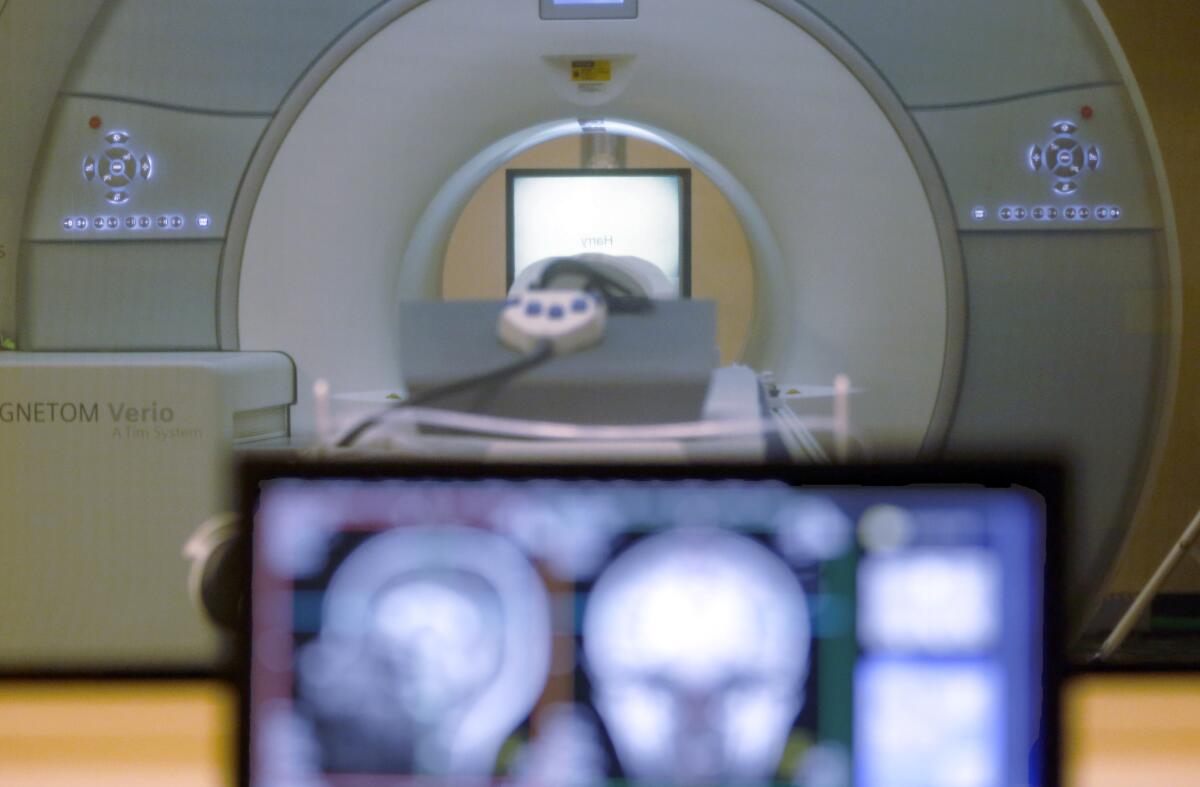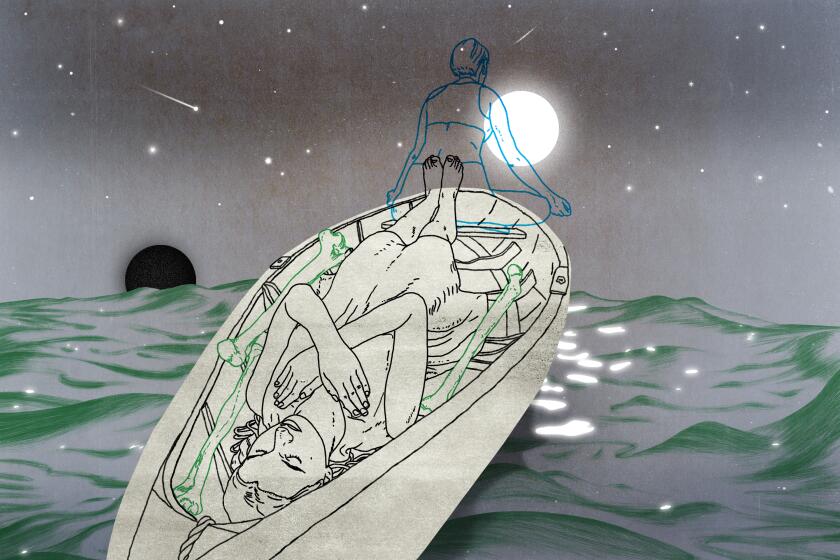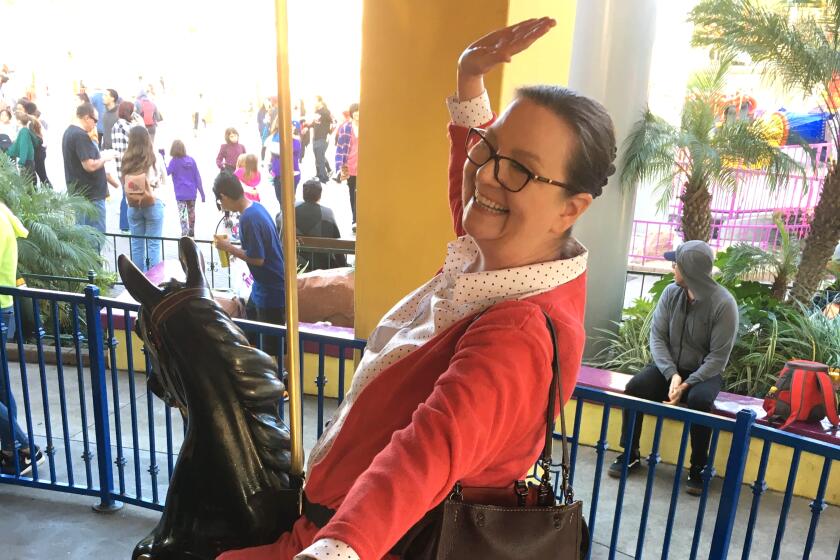I thought I had it made. Then I accidentally discovered my brain tumor

- Share via
Eating in my favorite Westside restaurant last December, I had cause for celebration. At last I had my life in order. My husband and I had just moved with our teenage daughter from New York to Los Angeles to be closer to our aging parents. Our high schooler had joined the basketball team and was making friends. We’d found what I hoped would be our forever home. My work as a counselor gratified me. I thought I had finally reached that elusive place: stable and successful adulthood.
Then in the wee hours that night, I woke up queasy. A delicious bite of sushi had made me ill. After feeling nauseated for five days, I checked into a hospital.
“The CT scan shows a mass at the base of your brain,” the emergency room doctor said. “We’ll need an MRI to see it in detail.” My chest froze as I worried that an unlucky rogue cluster of cells could kill me.
A death meditation may sound morbid, but often it’s a celebration of life. At a Pasadena shop, you can experience a moving death meditation for yourself.
“The battery of tests reveals an undetectable level of cortisol, the stress hormone,” the doctor went on.
“That’s why I’m so Zen right now?” I joked, trying to find calm.
“No, you could die without it,” she said. She explained that cortisol helped the body recover from emotional and physical trauma, such as eating tainted raw fish. I didn’t know what was more upsetting: hearing what was wrong inside me, or realizing I was now seeing two of her. And two clocks. I closed one eye and kept my mouth shut, too. I had enough problems already without adding “double vision” to the list.
“Would you be OK with a neurosurgeon coming onto your case?” she asked.
No, I wouldn’t.
“Yes,” I said, aiming to be a good patient.
I would have preferred to rewind to the seafood eatery and that short-lived moment of bliss. I remembered my wise Manhattanite friend Susan teasing me after I’d recently turned 50: “Now everything falls apart.” Hooked to machines, I was terrified that she might be right.
The surgeon came to discuss the MRI scans. He told me that the growth was crushing my pituitary gland, hindering my ability to produce thyroxine, testosterone and — most worrisome to him — cortisol. They needed to remove the tumor. “Most likely it’s benign,” he offered. I’d never received such grim and hopeful news in one breath.
My surgery was scheduled for two days later. I soon learned that most pituitary tumors were nonmalignant and often went undiagnosed because they don’t typically cause symptoms. Going from asymptomatic to the ER in five days, I was, it seemed, an exceptional case.
The day before my operation, the surgeon showed me an image of a forebrain, where my tumor sat, and how he planned to go through my sinuses to excise it: “We’ll have to drill through some bone.” He added that they might use fat from my abdomen afterwards to plug the hole. For once I didn’t regret the glazed doughnuts I’d eaten while pandemic isolating.
“The whole procedure is rather elegant,” he said. “I did three of them today.”
The whiplash between terrifying and promising news continued. When I confessed to having double vision for two days, the doctor told me it made sense — the tumor was pushing against my optic nerve. “Taking it out could restore your regular vision. Depending…” he trailed off. “For now the nurse will give you an eye patch.”
I slipped on the patch, feeling like a pirate exploring my own uncharted waters. When I asked how long the lump had been there, the surgeon said five or seven years, maybe longer.
For months, Beth Maureen Farestveit was confined to a hospital room with brain lymphoma. Hospice in her last week gave us the time we needed together.
I remembered an episode 10 years earlier when I’d suffered a bout of dizziness. An ear, nose and throat doc had ordered imaging to locate the problem. She’d observed “a little nodule” inside my cranium, telling me not to worry about it. Thinking back, I was miffed she hadn’t taken it more seriously. My neurosurgeon now confirmed that the same clump may have grown into the tumor.
The next morning, I was wheeled into the operating room and woke up to a resident telling me the surgery was over. Grazing my temples, I touched metal. It turned out I had needed stitches after moving around while unconscious during the procedure, causing a medical clamp to pierce my scalp. Following this revelation, a medic reported an infection in my spinal fluid drip culture. I had to stay longer for intravenous antibiotics.
Unsettled by the mounting complications, I called my pal Susan and recounted the whole ordeal. She gave me some perspective.
“Sounds like you got the good kind of brain tumor,” she said.
I laughed. Point taken. The mass was gone and I was on a path to recovery. I’d had helpful doctors all along the way. My insurance was going to defray much of the expense. I had my husband and daughter at home, and my mom nearby. Swept up in a moment of gratitude, I noticed my vision had returned to normal, too. Even the way I detected the tumor was lucky — it felt like food poisoning had saved my life.
In the ensuing weeks, I found myself no longer seeking perfect stability. After all, I’d just moved to Los Angeles — earthquake central. I had a survival kit sitting in my hallway closet. It showed me the same thing my medical scare had: In the face of the unpredictable, I’d be ready.
Haig Chahinian is a career counselor and is working on a memoir.
More to Read
A cure for the common opinion
Get thought-provoking perspectives with our weekly newsletter.
You may occasionally receive promotional content from the Los Angeles Times.











